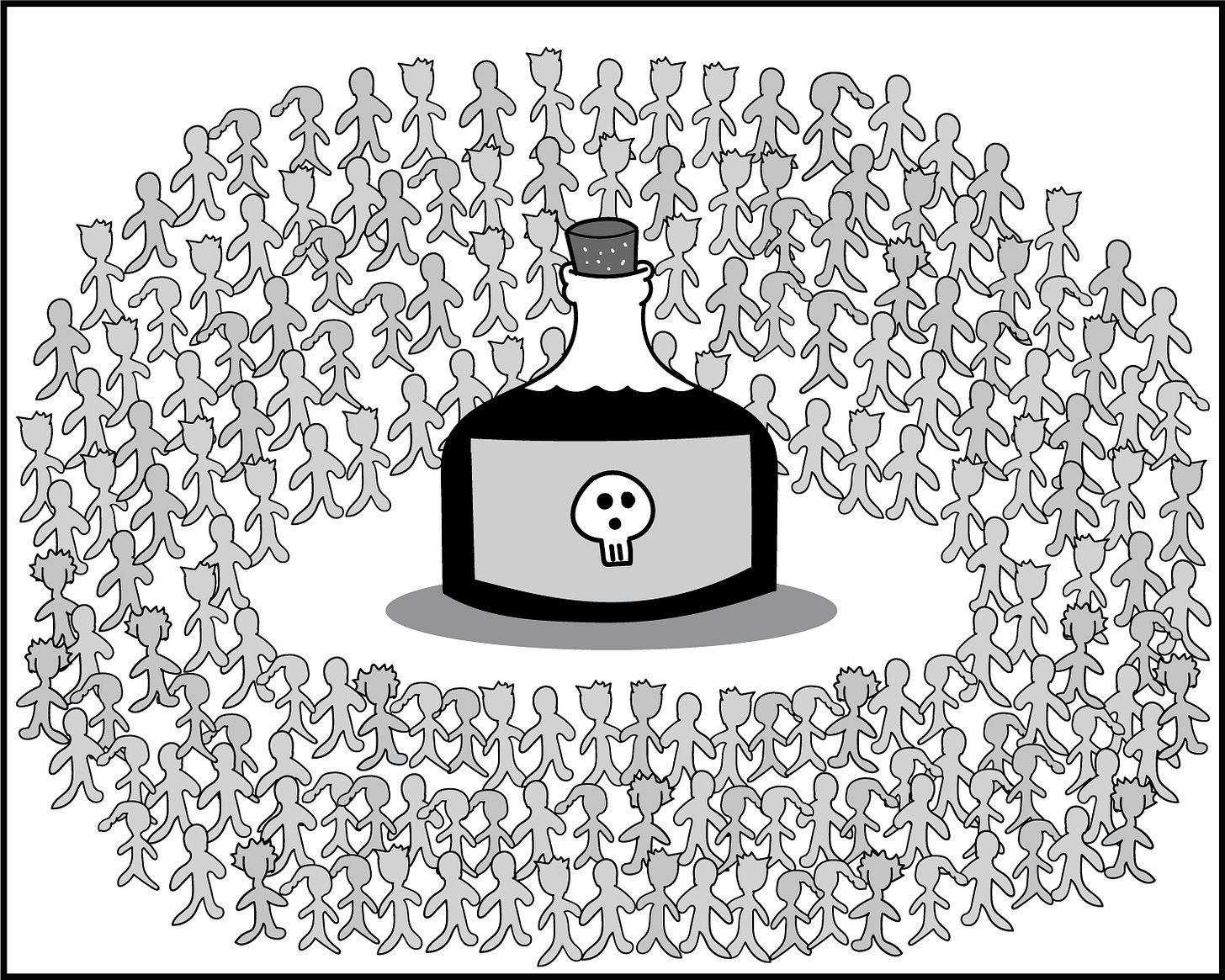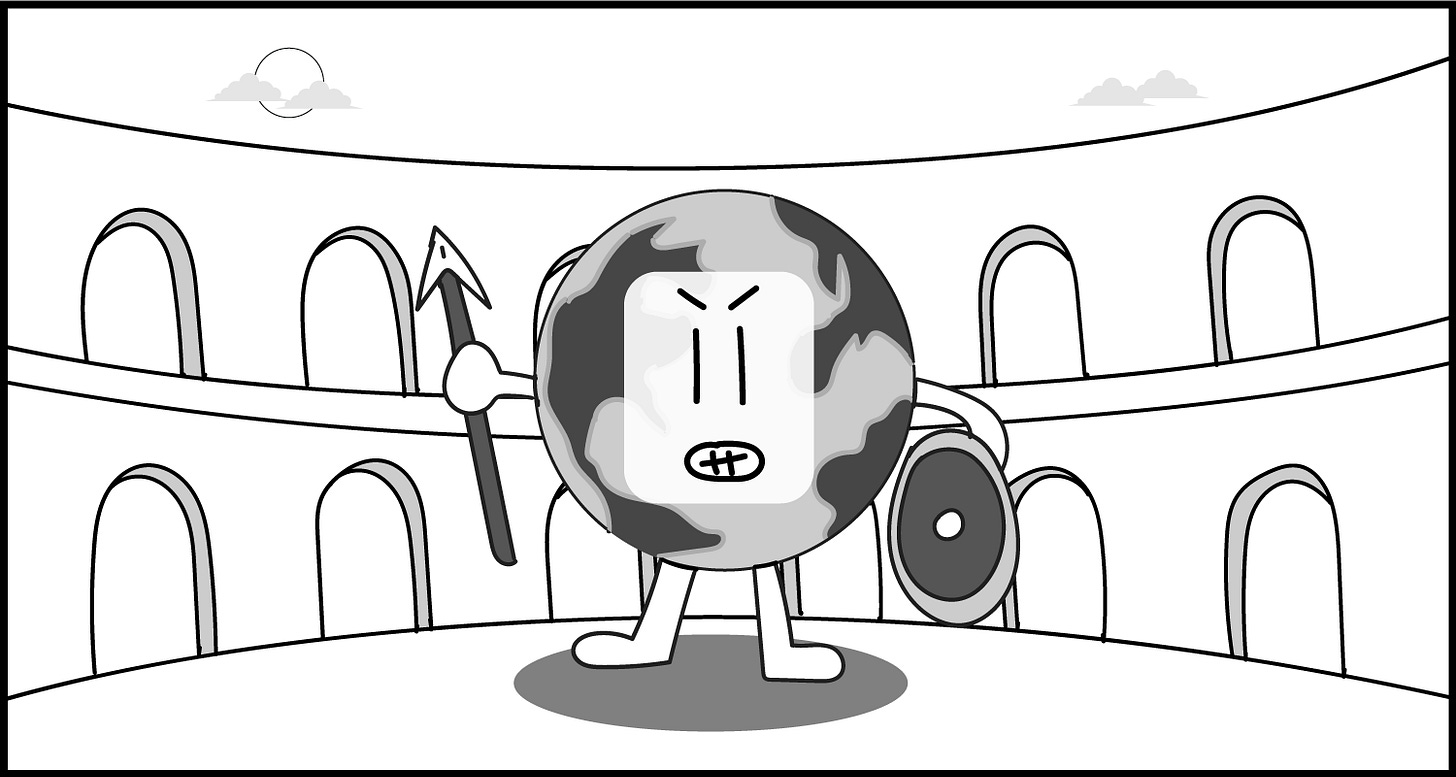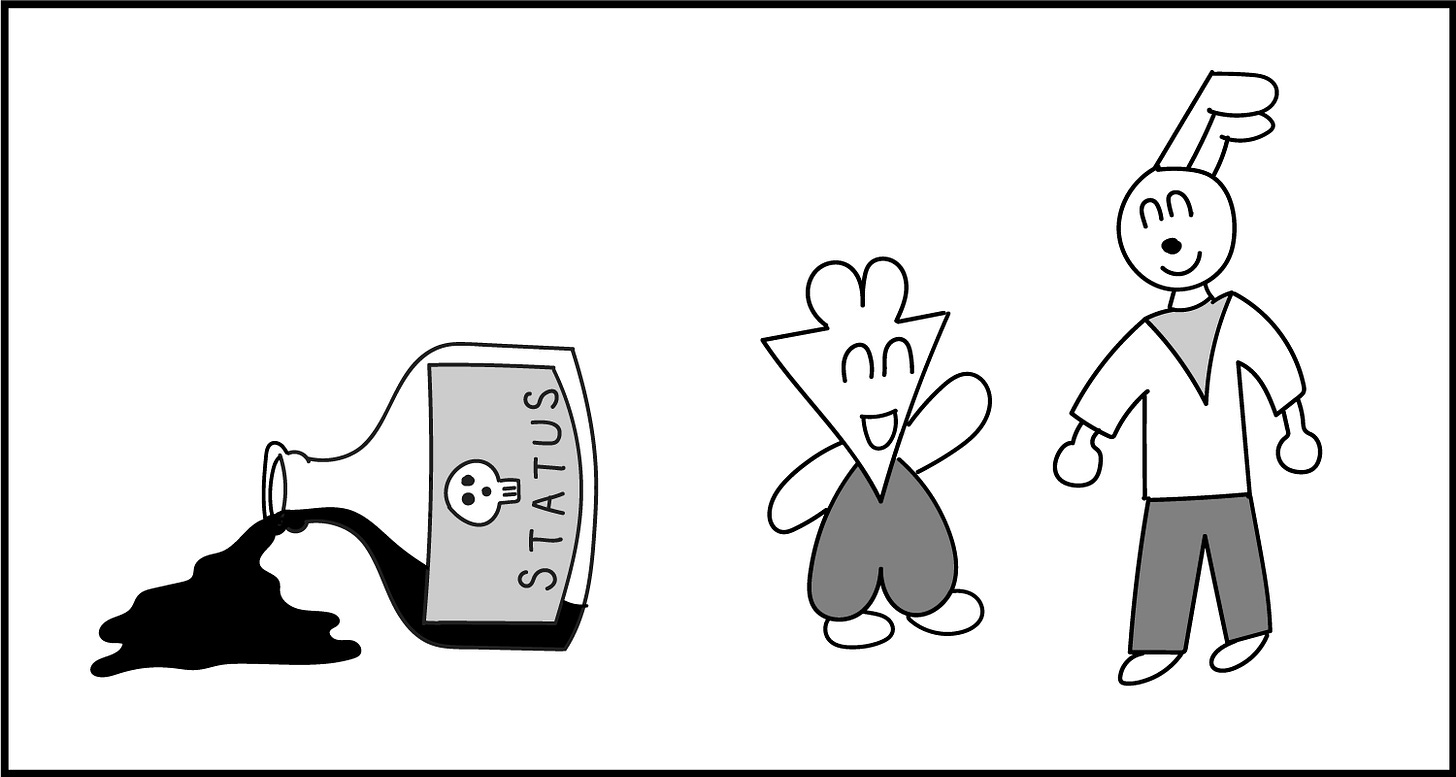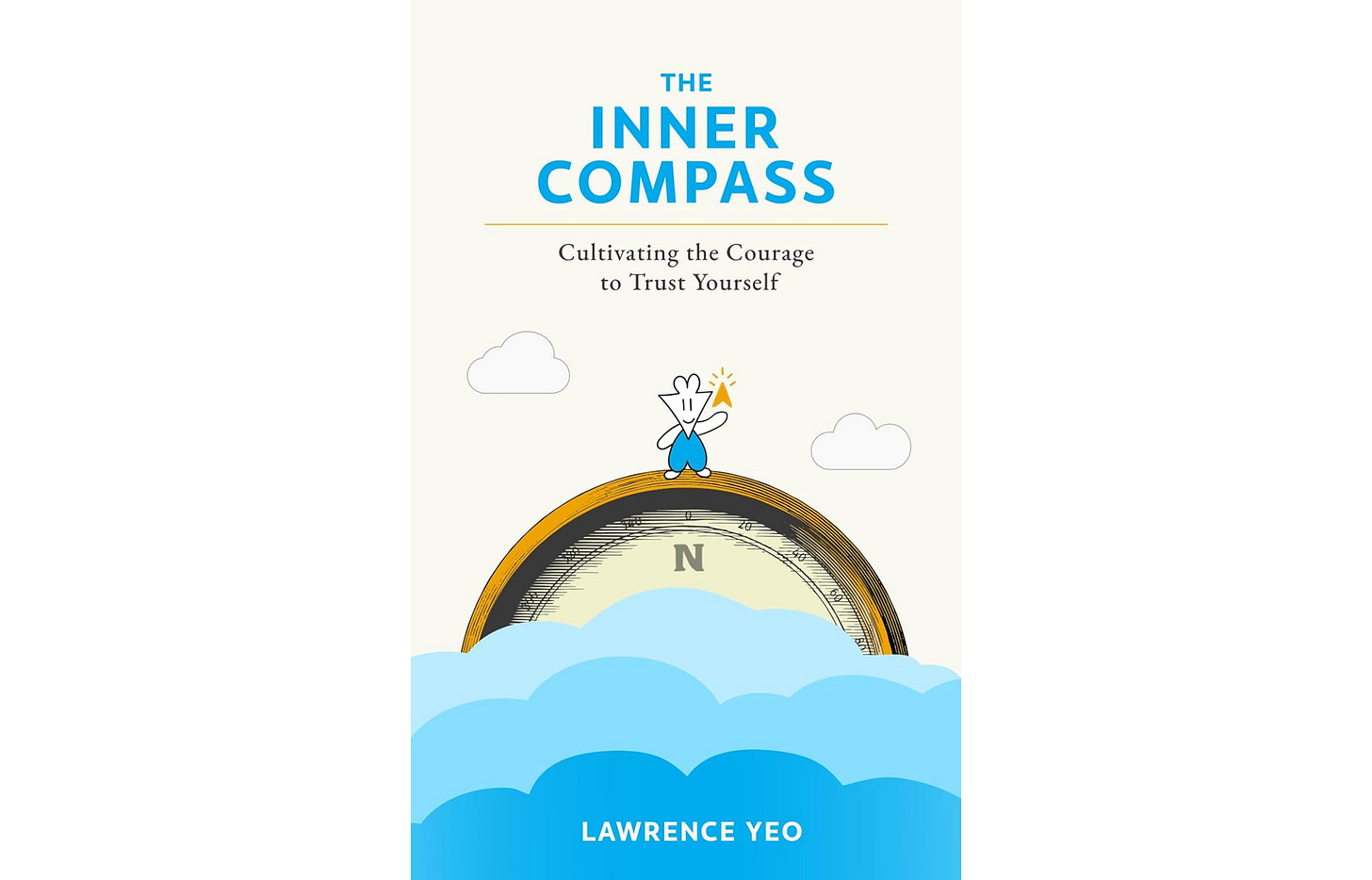The Poison of Status
Glasp’s Note: At Glasp, we value the close personal relationships we’ve built with thinkers, creators, and doers who fuel curiosity and growth. This week, we spotlight Lawrence Yeo, the founder of “More To That,” a platform where he crafts stories that explore the complexities of the human condition. You might remember him from his Glasp Talk appearance, where he crafts stories that explore the complexities of the human condition. Lawrence recently published his new book, “The Inner Compass,” and we were excited to collaborate again—he even wrote a special post for us.
If you want to reread or highlight this newsletter, save it to Glasp.
When I was in college, I worked in an office for the first time. I wasn’t used to this setting, as none of my prior jobs required me to sit in a cubicle and produce tedious reports. But while I quickly acclimated to the reality of my boxed workspace, what I couldn’t get used to was something I observed amongst my colleagues:
The way their behavior changed depending on one’s social standing.
If Bob held a higher title than John, then Bob would speak with a nonchalantness (and oftentimes arrogance) that he would never exhibit to his boss, Jane. And while Jane would always show up early to meetings with her boss, she would casually show up 15 minutes late to meetings with other folks. This collective charade was everywhere, and while we have a term that localizes it to the workplace (“office politics”), the truth is that this dynamic permeates many of our interactions at large.
The force that drives this charade is status, and it’s our thirst for it that drives every game we play. It’s what makes people feel superior to others, which makes them also assume inferiority when it comes to people they admire. Status is always zero-sum in this way; your arrogance only stretches as far as your subservience. People who act like obedient dogs in the face of their masters will be the first to bark orders in the face of their servants. There are no equals in the mind of someone chasing status, which means that the world will look like a never-ending arena of competition and envy.
Now, some will attempt to justify our playing of status games by claiming that it incentivizes people to create great things. That if we didn’t shower people with money or recognition, they wouldn’t go on to produce the technological and cultural advancements that make this world a better place.
While this may make sense at first glance, you’ll realize just how flawed it is when you take a moment to sit with it.
If someone is incentivized by status to develop a technology, how plausible is it that the resulting product stems from the desire to increase the well-being of the world? Of course, that’s what the innovator may claim, but deep inside, the selfish attachment to one’s position will take precedence over everything.
Take social media, for example. It’s been widely reported that social media has had disastrous effects on the population’s mental health, especially in our youth. If the people responsible for these tools were truly driven by the desire to create a better world, they would make sweeping reforms to ensure that their platforms never cause additional harm. But as you know, that rarely happens. Instead, they continue onward with their development, exploiting even more vulnerabilities in our psychology so they can maximize engagement and claim their place in the cultural zeitgeist. These people are not driven by the common good; they are driven by status.
The anthropologist Ernest Becker once wrote that we are “gods with anuses.” What he meant was that humans are equipped with godlike imaginations that can compose beautiful music, build towering skylines, and even send rockets into space. But at the same time, the biological container that houses this incredible mind has been inherited from our monkey ancestors. It is a body that defecates, secretes, and deteriorates until it ceases to function. The tension between what we’re capable of and what we’ve inherited is the core struggle of the human condition.
Status is one of those ugly things that we’ve inherited from our evolutionary ancestors, as the quest for dominance is seen throughout the animal kingdom. We all know this, yet our conditioning has convinced us to believe that it’s a worthy pursuit. It tells us that if you play the game right, you’ll get everything you desire. But of course, what you desire has also been planted by the game, ensuring that you’ll never be able to leave.
The solution is to do away with status and to choose compassion instead. Compassion is the ability to extend full presence to people, regardless of who they are or what they’ve achieved. It’s to see that people are not defined by their proximity to your goals, but by the unity of the human experience. In the end, we all find our way to the soil or the sea, and that humbling fact makes you appreciate every person who accompanies you on this ride.
There are some who claim that viewing the world without the lens of status is impractical and that you must play the game to achieve your goals. And to that I’d ask, “Who would you respect more: The person that strategically chooses who to appreciate, or the person that can do that for anyone?” The paradox of declining status is that there is a magnetism to it, and that manifests through the allocation of trust.
The people I admired most at the office weren’t the charismatic leaders who knew how to close deals. Rather, they were the few people who showed reverence for everyone, whether it was a potential client or the building custodian. They would know the names of all the cleaning staff and their family members, and would listen to them with the same presence they would have for their own boss. There were no motives to these dynamics other than being curious about the person in front of them, irrespective of who they were. That was my aspiration as well.
Krishnamurti said that “it is no measure of health to be well adjusted to a profoundly sick society.” When you see that this sickness is caused by our justification of status, then you’ll see just how healthy our relationships can be once you remove it. The immediate effect is that there’s a full embrace of the person in front of you, and there’s nothing you expect other than sharing that moment together. The long-term effect, which is even more profound, is that you start to embrace yourself without condition as well.
If the inner critic is a reflection of how you view others, then what happens when you no longer care about one’s status? Well, then you stop using your own place in society to determine your self-worth. You understand the frivolity of it all and see the utter hollowness of using achievement as a barometer for acceptance. You redirect any external attention back toward your inner compass and use it as the primary force to guide you.
This is why self-understanding is a communal affair. If reflection is the principle that reveals why you think the way you do, then relationship is the principle that helps you put those revelations in action. There’s a constant feedback loop between the self and the world, and this helps to refine your intuition over time.
But as you’ll recall, there’s one final principle to go over.
That’s because, as your intuition is refined, you learn so many lessons from each adjustment that is made. And what makes the self and the world feel fluid is when you share everything you’ve picked up along the way. By doing so, you dissolve the boundary between you and the other, and connect in a way that neither reason nor logic can quite explain.
The only way this happens is through the age-old principle of creation, which will reveal more about your capabilities than anything ever can.
Book: The Inner Compass: Cultivating the Courage to Trust Yourself
The Inner Compass is a book about building self-trust in the face of uncertainty. In a world where we are conditioned to be everybody but ourselves, this book is about building conviction in your own voice.
It’s a short read, coming in at roughly 100 pages to keep the message succinct, and it contains many illustrations to keep your curiosity engaged. By the end of the book, you’ll be equipped with the mental tools to strengthen your resolve and to trust in the unique voice that is your intuition.
Introducing the chapter
For the rest of this newsletter, I wanted to include a chapter from the book. I wanted to choose one that was short, could be understood without any prior context, and detailed an idea that may stick with you.
I’ve decided to choose Chapter 11, which is titled “The Poison of Status”. One of the core ideas of the book is that the pursuit of self-understanding is a communal affair. It’s not about being in a cave somewhere or meditating your way to enlightenment. No, it must be done in community with others, as a relationship is a mirror: the way you view others will reflect the way you view yourself.
The biggest obstacle to this pursuit, however, is the force of status. We have been conditioned to treat it as a virtue, but in reality, it’s what prevents us from seeing the best in one another.
So in this chapter, I will break down how exactly this obstacle works, and how to decrease its fervor so we can view people for who they are, and not for what they have to offer.
When you’re ready, let’s dive right in.
📣 Community Updates by Glasp
🟥 Glasp Talk with Lawrence Yeo:
Glasp Talk features intimate interviews with luminaries, revealing their emotions, experiences, and stories. The guest is Lawrence Yeo, the founder of “More To That,” a platform where he crafts stories that explore the complexities of the human condition. With over 38,000 subscribers to his newsletter and a unique storytelling approach, Lawrence has connected with readers globally.
Get a quick overview & summary
✨ Want a concise summary before diving in? Install the YouTube Summary with ChatGPT extension by Glasp for instant video summaries!
Would you like to take Glasp on the go?
With the Glasp mobile app, you can highlight and organize your favorite content anytime, anywhere. Stay productive on the move and never miss an insightful quote.
Partner With Glasp
We currently offer newsletter sponsorships. If you have a product, event, or service you’d like to share with our community of learning enthusiasts, sponsor an edition of our newsletter to reach engaged readers.









Thank you for the great post, Lawrence!
It reminds me of the article, "Status as a Service," that describes how social media uses humans' psychology to pursue social capital = status.
(https://glasp.co/kei/p/3p2G3W0rjMJ7zLeFJAb2)
Also, it lets me consider what we should do to make great social media that doesn't rely on the status game. Thanks for the post!
This is a thoughtful reminder of how deeply the pursuit of status shapes our lives! I like the contrast between the zero-sum nature of status and the infinite possibilities that come from compassion and presence. True respect comes not from chasing titles, but from how we treat every person we meet :)